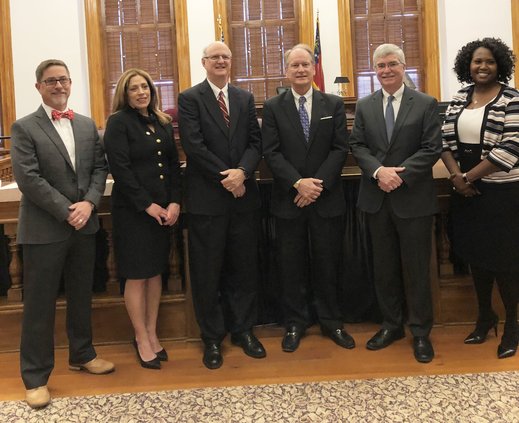MONROE, Ga. — Superior Court Judge John Ott says he would have retired in 2020 after three decades on the bench but a few unexpected things got in the way and convinced him to stay.
Ott has presided over criminal and civil cases in Newton and Walton counties since Gov. Joe Frank Harris appointed him to the Alcovy Judicial Circuit judgeship to replace Greeley Ellis in 1990.
The Monroe resident recently announced he planned to retire from one of five Superior Court judge positions in the circuit on Dec. 31 — with two years remaining in his term. Gov. Brian Kemp likely will appoint a replacement before the end of the year.
The circuit was a relative model of stability for decades, even after the addition of a fifth judgeship to which then-District Attorney Ken Wynne was appointed in 2010.
However, judges Samuel Ozburn and Eugene Benton said in September 2019 they would not seek re-election in 2020. The pandemic began in March 2020 and, on July 1, 2020, Judge Horace Johnson Jr. died from complications of COVID.
Ott said he did not want to leave Wynne without experienced judges “with the understanding to myself” that Ott would know when it was time to step down.
Gov. Brian Kemp ultimately appointed then-District Attorney Layla Zon to fill Ozburn’s seat after Ozburn stepped down April 30 before his term ended.
Kemp also appointed Cheveda McCamy from her position as an assistant DA in Henry County to fill Johnson’s seat.
Former Monroe attorney Jeff Foster won election to replace Benton on Jan. 1, 2021.
Ott said all three quickly learned their ways around their new jobs “like a duck to water” — making him confident that he could retire this year.
Ott, who also contracted COVID at one point in 2020, said he also wanted to wait for the pandemic to recede.
“I thought it would only take a year,” he said.
The veteran jurist said he is healthy for a 68-year-old and wants to spend time helping his stepson and his wife with their children, including two rambunctious boys ages 6 and 4.
He said he has offered to serve as a senior judge which allows him to hear cases anywhere in Georgia when requested to fill in for regular judges who are ill or otherwise unable to preside over a particular case.
However, as senior judge he is able to decline hearing cases rather than being committed to a regular schedule of court days, Ott said.
Ott served one term and part of another as district attorney from 1985 to 1990 after seeking election as a Democrat during a period when the Democratic Party dominated the General Assembly and all statewide offices.
However, when asked about how he feels about those in positions of hearing and prosecuting cases involving state law being forced to seek election under a political party banner, Ott said he believed the district attorney and probate judge positions should be elected on a nonpartisan basis.
In local races, the electorate typically knows the candidate’s personal views well enough to know how they would stand on partisan issues, Ott said.
He said the toughest cases for him personally to preside over in 32 years on the bench typically involved murder cases.
Most were “senseless” and often had a “horrific” impact on the families of both murderer and victim, he said.
Child molestation cases also are difficult because of the need to put sometimes very young victims on the stand to recount the horrors of the crime, he said
Superior Court judges also preside over most divorce cases in Georgia. Ott said the most difficult part of divorce cases for him involved decisions on who should retain custody of the couple’s children.






